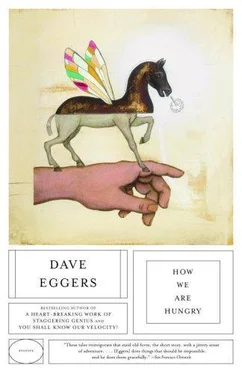Dave Eggers - How We Are Hungry
Здесь есть возможность читать онлайн «Dave Eggers - How We Are Hungry» весь текст электронной книги совершенно бесплатно (целиком полную версию без сокращений). В некоторых случаях можно слушать аудио, скачать через торрент в формате fb2 и присутствует краткое содержание. Год выпуска: 2005, Издательство: Vintage Canada, Жанр: Современная проза, на английском языке. Описание произведения, (предисловие) а так же отзывы посетителей доступны на портале библиотеки ЛибКат.
- Название:How We Are Hungry
- Автор:
- Издательство:Vintage Canada
- Жанр:
- Год:2005
- ISBN:нет данных
- Рейтинг книги:3 / 5. Голосов: 1
-
Избранное:Добавить в избранное
- Отзывы:
-
Ваша оценка:
- 60
- 1
- 2
- 3
- 4
- 5
How We Are Hungry: краткое содержание, описание и аннотация
Предлагаем к чтению аннотацию, описание, краткое содержание или предисловие (зависит от того, что написал сам автор книги «How We Are Hungry»). Если вы не нашли необходимую информацию о книге — напишите в комментариях, мы постараемся отыскать её.
A Heartbreaking Work of Staggering Genius
How We Are Hungry — читать онлайн бесплатно полную книгу (весь текст) целиком
Ниже представлен текст книги, разбитый по страницам. Система сохранения места последней прочитанной страницы, позволяет с удобством читать онлайн бесплатно книгу «How We Are Hungry», без необходимости каждый раз заново искать на чём Вы остановились. Поставьте закладку, и сможете в любой момент перейти на страницу, на которой закончили чтение.
Интервал:
Закладка:
The tent is yellow. The sun makes the tent seem alive; she’s inside a lemon. The air seems to be yellow, and everything that she knows about yellow is here — its glory and its anemia. It gets hotter, the sun reigning throughout the day, giving and giving, though with the heaviest heart.
The night goes cold. They are at 14,500 feet and the air is thin and when the sun disappears the wind is cruel, profane. The rain comes again. Frank and Patrick are amazed by the rain, because they say it is rare in this valley, but it begins just when the sun descends, a drizzle, and by dinner is steady. The temperature is plunging.
At dinner, tomorrow’s hike — the final ascent — is mapped out. They will rise at 6 a.m., walk for eight hours, and stop at the high camp, where they’ll eat and then sleep until 11 p.m. At 11, the group will get up, get packed, and make the final six-hour leg in the dark. They will reach the peak of Kibo at sunrise, take pictures, and dawdle for an hour before making the descent, eight hours to the final camp, halfway down the mountain, the path shooting through a different side this time, less scenic, quicker, straighter.
Shelly asks if all the porters go up with the group.
“What, up to the top? No, no,” Frank says. About five do, just as guides, basically, he says. They come with the group, in case someone needs help with a pack or needs to go down. The rest of the porters stay at camp, then break it down and head out to meet the group at the final camp, on the long hike down.
After she’s eaten, very little, Rita exits the tent and quickly bumps her head against the ear of a porter. It’s the man with the water by the stream.
“Jambo,” she says.
“Hello,” he says. He is holding a small backpack. There are about twenty porters around the dining tent, though only three are carrying dishes away. With the tent empty, two more are breaking down the card table and chairs. The tent is soon empty and the porters begin filing in, intending, Rita assumes, to clean it before disassembling it.
Rita lies down. She lies down with great care and deliberation, resting her head so slowly onto the pillow Shelly has created for her from a garbage bag full of soft clothes. But even the small crinkling sound of the garbage bag is as loud as the collision of planets. Rita is scared. She sees the gravestone of the young man who died here six months before — they had a picture of it, and him — a beautiful young man grinning from below a blue bandanna — at the hotel, laminated on the front desk, to warn guests about pushing themselves too far. She sees her body being taken down by porters. Would they be careful with her corpse? She doesn’t trust that they would be careful. They would want to get down quickly. They would carry her until they got to the rickshaw gurney and then they would run.
She listens as the paying hikers get ready for bed. She is in her sleeping bag and is still cold — she is wearing three layers but still she feels flayed. She shivers but the shivering hurts her head so she forces her body to rest; she pours her own calm over her skin, coating it as if with warm oil, and she breathes slower. Soon something is eating her legs. A panther is gnawing on her legs. She is watching the panther gnawing and can feel it, can feel it as if she were having her toes licked by a puppy, only there is blood, and bone, and marrow visible; the puppy is sucking the marrow from her bones, while looking up at her, smiling, asking What’s your name? Do you like zebras?
She wakes up when she hears the rain growing louder. She shakes free of the dream and succeeds in forgetting it almost immediately. The rain overwhelms her mind. The rain is strong and hard, like the knocking of a door, the knocking getting louder, and it won’t end, the knocking — sweet Jesus will someone please answer that knocking? She is freezing all night. She awakens every hour and puts on another article of clothing, until she can barely move. She briefly considers staying at this camp with the porters, not making the final climb. There are photographs. There is an IMAX movie. Maybe she will survive without summitting.
But she does not want to be grouped with Mike. She is better than Mike. There is a reason to finish this hike. She must finish it because Shelly is finishing it, and Grant is finishing it. She is as good as these people. She is tired of admitting that she cannot continue. For so many years she has been doing everything within her power to finish but again and again she has pulled up short, and has been content for having tried. She found comfort in the nuances between success and failure, between a goal finished, accomplished, and a goal adjusted.
She puts on another T-shirt and another pair of socks. She falls back to sleep. She wakes up in the dark, not long before dawn, and Shelly is holding her, spooning.
The light through the vent is like a crack into a world uninterrupted by shape or definition. There is only white. White against white. She squints and reaches for her sunglasses, reaches around to no avail, feels only the rocks beneath the tent. She is breathing as deeply as she can but it has no effect. She knows her head is not getting enough blood. Her faculties are slipping away. She tries to do simple mental tasks, testing herself — the alphabet, states of the union, Latin conjugations — and finds her thoughts scattered. She inhales so deeply the air feels coarse, and exhales with such force her chest goes concave. Shelly is still asleep.
It’s the first light of morning. If there is sun the rain must have passed. It will not be so cold today — there is sun. Already she is warmer, the tent heating quickly, but the wind is still strong and the tent ripples loudly.
What is that? There is a commotion outside the tent. The porters are yelling. She hears Frank, so close, unzip and rezip his tent’s door, and then can hear his steps move toward the voices. The voices rise and fall on the wind, fractured by the flapping of the tent.
There is someone trying to enter.
“Shelly,” Rita says.
“Yes hon.”
“Who is that?”
“That’s me, dear.”
Hours or seconds pass. Shelly is back. When did she leave? Shelly has entered the tent, and is now slowly rezipping the doorflap, trying not to bother her. Hours or seconds?
“Rita honey.”
Rita wants to answer but can’t find her tongue. The light has swept into her, the light is filling her, like something liquid pushing its way into the corners of a mold, and soon she’s fading back to sleep. Hours or seconds?
“Rita honey, something’s happened.”
Rita is now riding on a horse, and she’s on a battlefield of some kind. She is riding sidesaddle, dodging bullets. She is invincible, and her horse seems to be flying. She pats her horse and the horse looks up at her, without warmth, bites her wrist and keeps running, yanking on its reins.
Later she opens her eyes and it doesn’t hurt. Something has changed. Her head is lighter, the pain is diminished. Shelly is gone. Rita doesn’t know what time it is. It’s still bright. Is it the same day? She doesn’t know. Everyone could be gone. She has been left here.
She rises. She opens the tent door. There is a crowd around two men zipping up a large duffel bag. The zipper is stuck on something pink, fabric, a striped pattern. Now they have the duffel in the air, the bag connecting their left shoulders, and there are men around them arguing. Patrick is pushing someone away, and pointing the porters with the duffel down the path. Then there is another huge duffel, carried by two more porters, and they descend the trail. Grant is there. Grant is now helping lift a third duffel bag. He hoists his half onto his shoulder while another porter lifts the other side, and they begin walking, down the trail, away from the summit.
Читать дальшеИнтервал:
Закладка:
Похожие книги на «How We Are Hungry»
Представляем Вашему вниманию похожие книги на «How We Are Hungry» списком для выбора. Мы отобрали схожую по названию и смыслу литературу в надежде предоставить читателям больше вариантов отыскать новые, интересные, ещё непрочитанные произведения.
Обсуждение, отзывы о книге «How We Are Hungry» и просто собственные мнения читателей. Оставьте ваши комментарии, напишите, что Вы думаете о произведении, его смысле или главных героях. Укажите что конкретно понравилось, а что нет, и почему Вы так считаете.












